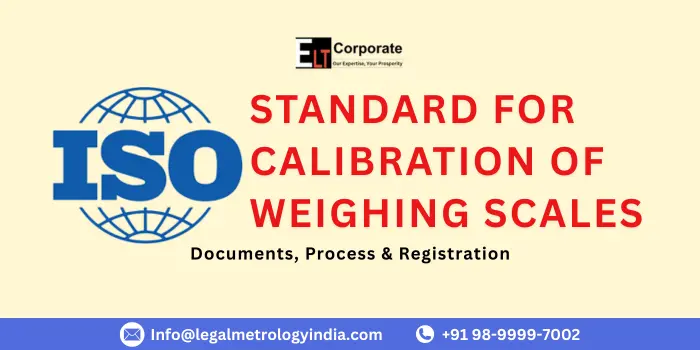Let’s understand the meaning of the ISO standard for calibration of weighing scales, ISO “International organisation for Standardization” gives the structure of rules to calibrate and verify the correctness of weighing scales. It helps us trust the businesses. Weighing scales are necessary equipment utilized all over the industries, even laboratories, factories and retail shops. Accurate weight checking is mandatory to ensure fairness, safety, and quality control. Calibration of these weighing scale instruments is important to ensure their measurements are right and consistent. This procedure confirms that the scales are following proper international standards set by ISO. From this blog you will know the Importance of ISO standards for calibration of weighing scales and more.
Meaning of ISO Standard for Calibration of Weighing Scales
The ISO standard for the calibration of weighing scales is ISO 9001. This is the worldwide standard that outlines how to handle consistent quality management systems. Calibration standards such as ISO/IEC 17025 valid for certain testing and calibration laboratories. These rules confirm that weighing scales are calibrated frequently and accurately to give right measurements.
ISO/IEC 17025: Calibration and Testing Laboratories Standard
ISO/IEC 17025 is an extensive standard utilized to assure that calibration and testing laboratories are competent in giving accurate and reliable calibration services. This standard explains the requirement for laboratory facilities that do testing and calibration, ensuring that hardware like weighing scales is estimated and calibrated according to worldwide rules. It additionally covers perspectives, for example, equipment maintenance, calibration process, and the qualifications of technicians, making it an important standard for all laboratories or businesses performing equipment calibrations.
Important features of ISO/IEC 17025
- Specify the technical competence of calibration laboratories.
- Demonstrate the structure for calibration equipment and measurement uncertainty.
- Make sure the traceability to international standards, offering detailed and right measurement.
ISO 9001: Quality Management System Standard
ISO 9001 is an international standard for QMS. While it doesn’t concentrate on measurement scales, it is a necessary part of guaranteeing that associations keep up with consistency in their calibration processes. ISO 9001 rule requires businesses to document all their processes, handle a quality management system, and conduct audits daily to confirm that calibration processes are right and comply with the required standards. For all the companies that rely on the calibration of weighing scales, following ISO 9001 helps in making sure that their calibration procedure is efficient, documented, and meets the needed regulatory standards.
Importance Of ISO Standard for Calibration of Weighing Scales
Calibration makes sure that a weighing scale checks the weight accurately. Without complete calibration, the scale may give wrong readings, leading to latent risks. For instance, in the retail industry, wrong scales can lead to undercharging or overcharging customers. Calibration is important to maintain fairness, compliance with legal rules, and efficiency of the work.
How Often Should Weighing Scales Be Calibrated?
The frequency of calibration depends on various reasons, for instance how frequent scale is utilized, the environment it’s utilized in, and the information required for the measurement overall.
- Commercial Scales (Retail) – Every 6 to 12 months.
- Industrial Scales (Manufacturing) – 6 months to 1 year.
Laboratory Scales (Precision) – Regular audits, for example 3 to 6 months. If equipment is moved, subjected to intensive use , or shows signs of wear and tear, more usual calibration may be important.
How Do You Know Your Weighing Scale Needs Calibration?
If you want to know that your scale requires calibration then these points might help you:-
- Erratic or Inconsistent Readings – In most cases measuring equipment shows different readings for a similar item.
- Physical Damage – Some mechanical damage or displacement of the scale can affect its accuracy.
- Environmental Changes – Temperature, humidity, or vibration in the environment can have an impact on the measurement scale, as it will drift from its calibrated setting.
- Daily Use – High-frequency utilization can result in wear and tear, needing daily recalibration.
You can check it by simple test using approved certified reference weights. If the scale gives wrong or irregular readings when tested with regular weight, then it is time to recalibrate.
Can You Calibrate a Weighing Scale Yourself?
Generally, basic calibration can usually be done through the manufacturer’s manual, mainly for less complicated scales. However, for great accuracy equipment or scales utilized in crucial applications, it is always preferable to hire professional calibration services. Professional confirms that the calibration procedure follows ISO standards, checks for measurement unreliability, and assures the scale’s correctness
Benefits of ISO Standard for Calibration of Weighing Scales
To know the benefits of ISO calibration you can check the table mentioned below:-
| S.No | Benefits of ISO Calibration | Description |
|---|---|---|
| 1. | Accuracy and Reliability | ISO standards confirm that the weighing scales devices give the right and consistent measurements. |
| 2. | Compliance | Subsequently, ISO guidelines assist businesses meet legal regulatory requirements. |
| 3. | Quality Assurance | ISO standards confirm that the weighing scale devices give the right and consistent measurements. |
| 4. | Cost-Effectiveness | Complete calibration avoids the financial losses that could arise from wrong measurement and decreases the probability of costly errors. |
Conclusion
Calibration of weighing scales is not only about guaranteeing accuracy, but primarily about maintaining fairness, compliance with regulations, and operational efficiency. By following these ISO standards, for example, ISO/IEC 17025 for calibration and ISO 9001 for quality management systems, businesses and laboratories can make sure that their weighing instruments regularly deliver the right and reliable measurements. Regular calibration promotes clients’ trust and satisfaction as well as can help in following every legal requirement and industry guideline. Getting your scales calibrated by experts ensures that your equipment works within the needed tolerance. This by and large outcomes in smoother business tasks, upgraded item quality, and lawful consistency.
What is the ISO Standard for Weighing Scales Calibration?
The ISO standard primarily governing weighing scale calibration is ISO/IEC 17025, which makes sure that calibration laboratories are competent to carry out accurate calibration. ISO 9001 is also appropriate for handling quality systems that oversee the calibration procedure.
How Often Should I Calibrate My Weighing Scale?
The calibration frequency relies on the scale’s usage and environment but normally scales should be calibrated every 6 to 12 months.



